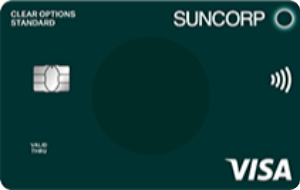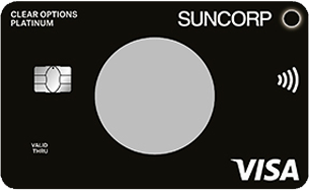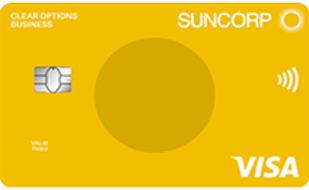Suncorp Credit Cards

As a leading provider of insurance, banking, superannuation and investments, Suncorp can draw on a vast amount of experience to bring you the financial products and services to suit you. With some great options on credit cards, Suncorp provides introductory offers, low rates and a range of features and benefits.

Suncorp Clear Options Standard Credit Card
0% p.a. on balance transfers for 20 months
Suncorp Clear Options Business Credit Card
Business card with points earn
We found no credit cards using your selected criteria
Update your filters to get more cards to display. Reach out if you are having any problems.
Suncorp Bank. Surprised?
Established more than a century ago, Suncorp Bank prides itself on being a “genuine alternative to the major banks”. Suncorp says that with its size, it can offer all the capability of a big bank, but with its roots, it can still offer that small bank feel.
Suncorp Bank
Okay, so we all know the Big Four. Westpac, Commonwealth Bank, ANZ and NAB. But, what you may not know is which bank comes in fifth place. Which bank follows those four juggernauts to take its place as Australia's fifth-largest bank?
Suncorp Bank has plenty to offer in the way of banking: transaction accounts and savings accounts, home loans and personal loans. But let's look at its credit card offering.
Suncorp Bank currently has four credit cards on the table, each offering something that's a little bit different. Whether it’s a money-saving low rate card, a business card, or a gold or platinum rewards card, Suncorp Bank has it covered. Interested? Let’s take a closer look.
Low Interest, Classic Benefits
A standard credit card is rarely flashy. While it may have a few little perks, those perks are small potatoes. If you were to compare a standard card with say, a platinum card, the platinum card would win hands down on features. From personal concierge services to complimentary insurances, platinum cards are simply set up to offer more.
However, if you're not looking for flashy, then there’s no point paying for it. By choosing a platinum card with awesome extras, you will usually pay a higher annual fee – and often, a higher rate of interest on purchases. If you don’t need all the bells and whistles, a – much cheaper – standard card may be a better option.
If you want a low cost card, check out Suncorp Bank’s no frills option. The Suncorp Clear Options Standard Credit Card does not encourage overtures of excitement. Like we said, it’s no frills. It has few features – but funnily enough, it does still work as a credit card. For anyone who simply wants a credit card, this little guy could be a good choice.
Benefits of a Low Rate Card
Who wants to pay more than they need to? On anything? With a low rate credit card you can choose to pay less in interest on your balance. Instead of plodding along with a card with a high interest rate, you can choose a low rate card to pay less in interest.
Some credit cards charge as much as 23% p.a. on purchases. Compare that to low rate cards with purchase rates that range from 10% to 13% p.a. It’s pretty easy to see just how much money you could save simply by having a low rate option in your wallet.
Now, if you pay off the balance in full each month, it doesn’t really matter how much your card charges in interest. It won’t affect you. However, if you retain a balance, then it makes sense to choose to pay the lowest possible rate of interest on that balance. This can allow you to pay less in interest overall, hopefully paying off everything you owe much faster.
Why keep a balance? Well, you shouldn’t really. But, reality can sometimes get in the way of good intentions. Perhaps you overspent on your card. Perhaps you had a costly emergency to cover. Perhaps you were short on cash before payday. Whatever the reason, if you tend to retain a balance, be sure to choose a card with the lowest possible purchase rate.
Big Rewards
There are plenty of rewards cards on the market, either offering rewards in the form of cashback, merchandise or frequent flyer points. However, not all rewards cards suit all cardholders. The key to choosing the right rewards card is of course, to compare what’s out there.
Suncorp actually has two rewards cards to choose from. The Suncorp Clear Options Gold Credit Card and Suncorp Clear Options Platinum Credit Card obviously work as both rewards cards and gold and platinum cards. To choose between them means thinking about how you will use them, and how much you are willing to pay.
Before we get into Suncorp’s rewards cards, we first need to look at rewards cards in general. How do you know what to look for? How do you know if a rewards card is right for you?
Points-earning Potential
One of the first things to consider when comparing rewards cards is their points-earning potential. That means, how many points can you earn when using your card. For example, Suncorp’s Gold Card earns 1 Rewards Point for every $1 spent. Meanwhile, its Platinum Card earns 1.25 Rewards Points for every $1 spent.
While it may seem the natural choice to opt for the card with the higher points-earning potential, you should also consider how much you are paying for that higher earn rate. The platinum card has a higher annual fee than the gold card. It also has a slightly higher purchase rate. Always weigh up how much you pay for a rewards card, balancing it against the value you are getting in return.
Point Value
Which is where we come nicely to point value. It’s essential that you look at the value of the points you are earning. There’s no point choosing a card that earns 20 points for every dollar spent, if those points aren’t worth anything when you redeem them.
Instead, try to choose a card that offers the maximum rewards for your everyday spending, taking into account what those points are worth when you cash them in. It goes without saying that you should also opt for a card that offers rewards you actually want.
The Small Print
As with any type of credit card, it pays to read the small print. First up, points capping. Find out if there is an annual points cap on the card. Also check whether your points expire after a certain period of time. This can help avoid any unpleasant surprises later on down the line.
Making it Worthwhile
When it comes to rewards cards, value is the key word. You will often find that you need to spend big to get value from your rewards program. Why? Think about how much you are paying in annual fees.
Let’s look at Suncorp’s Gold Card as an example. With Suncorp Bank Rewards, you can exchange 20,900 points for a $100 JB Hi-Fi gift card. That means you would need to spend $20,900 on the card to get $100 back. The annual fee for this card is $120. So, to make it worthwhile, you would need to spend well over $20,900 each year on your card to get value from your rewards program.
And here’s where that small print comes in. You will earn 1 point per $1 up to $1500 per month. After that, it drops to 0.5 points per $1. Twelve months at $1500 is $18,000. You can earn that $100 gift card, but after that, your points-earning potential drops by half.
We’re not saying this example from Suncorp is good or bad. We’re just pointing out that you need to think about what you’re getting in return when you pick up a rewards card. Any rewards card!
Gold Incentives & Platinum Perks
As we know, Suncorp’s rewards cards are available in gleaming gold and pretty platinum. What does that mean? Gold and platinum benefits, of course.
Credit cards have long featured a tiered system. This allows card providers to offer tiered benefits to cardholders – and to charge accordingly. Gold cards tend to offer more features than standard cards, and will usually charge more in annual fees. Platinum cards offer even more features than gold cards, and tend to charge higher annual fees again.
It’s also worth noting annual income requirements here. Gold and platinum cards often have higher minimum income requirements and maximum credit limits, making them somewhat of a status symbol. In Suncorp’s case though, income requirements are actually pretty low. For the standard card, the minimal annual income requirement is $25,000, for the gold card it’s $30,000, and for the platinum card it’s $35,000.
Aside from status, gold and platinum cards are all about those features and extras. By paying more for your card, you can expect more in return. So, what does Suncorp have to offer in the way of features?
The Gold Card
Putting its rewards program to the side, the Suncorp Gold Card offers a few nifty features. As a cardholder, you can benefit from purchase cover and guaranteed pricing. You can also enjoy free membership to Suncorp Bank Rewards Program, and up to 55 days interest free on purchases.
The Platinum Card
Again, the rewards program is the drawcard on this one. It allows cardholders to earn at a higher rate, but it also offers an opt-in to Suncorp Qantas Frequent Flyer for $49 per year. With this, cardholders can earn Qantas points at a rate of 0.5 points per $1 spent.
Aside from that though, there are some nice platinum perks on offer. First there are the complimentary insurances. These include international travel insurance, transit accident insurance, guaranteed pricing, extended warranty and purchase cover. Cardholders can also benefit from a personal concierge service, and special offers and exclusive discounts on entertainment, sport and travel.
Big Business
Suncorp knows credit card spending isn’t always personal. Credit cards can also come in handy with business spending. Which is where the Suncorp Clear Options Business Credit Card comes in. Helping to ease business cashflow, this business card could be a great asset to a business.
With a low annual fee, this card allows business users to track their spending, while also benefitting from up to 55 days interest free on purchases. There is also an optional rewards program that allows cardholders to choose their membership level.
Looking to add more cardholders to the account? You can issue additional cards to employees, each with a set monthly limit. Each cardholder then receives an individual statement, helping to keep track of company spending and expenses.
Who is Suncorp?
It’s likely you’ve seen one or two Suncorp advertisements in passing. But who is Suncorp Bank exactly? Established in 1902, Suncorp Bank has a long history in Australia. Over the years, Suncorp Bank has grown in size, while still retaining its same values.
What are those values? According to Suncorp, the bank is all about “genuine people, and genuine conversations”. As we said earlier, Suncorp Bank is there to offer a “genuine alternative” to other, bigger banks. That means it genuinely offers 190 branches and 1650 ATMs, as well as award-winning internet and phone banking.
Talking of awards, Suncorp Bank happened to take home Money magazine’s Bank of the Year 2020. So, it must be doing something right.
What about credit cards? Is Suncorp Bank the right credit card provider for you? As we’ve seen, Suncorp Bank has a decent range of credit cards available. If you want a no frills card that saves you money on interest, Suncorp’s Standard Card could be for you.
If you want more from your card, Suncorp has that covered too. Tiered benefits from its Gold Card and Platinum Card allow you to choose the right option for you. Choose the features and extras you need, balanced against the amount you want to pay in annual fees. Or perhaps you want to earn business rewards? Yep, that’s on offer too, from Suncorp’s Business Card.
Any questions? Just take a closer look to find out which card suits you best.
Who underwrites Suncorp credit cards?
NAB is the credit provider and issuer of Suncorp credit cards. NAB acquired Suncorp when it took over Citi in 2022.
Suncorp Credit Cards - Frequently Asked Questions
Recently Asked Questions
Something you need to know? Ask our credit card expert a question.
Ask a question
Hi, I’m a personal finance expert who loves to help you out! I’ll answer your question within a business day. Pinky swear.
















Bala
2 December 2022Pauline
5 December 2022Henry
1 June 2016Roland
2 June 2016David
20 January 2016Roland
21 January 2016justin walker
20 October 2015Roland
21 October 2015